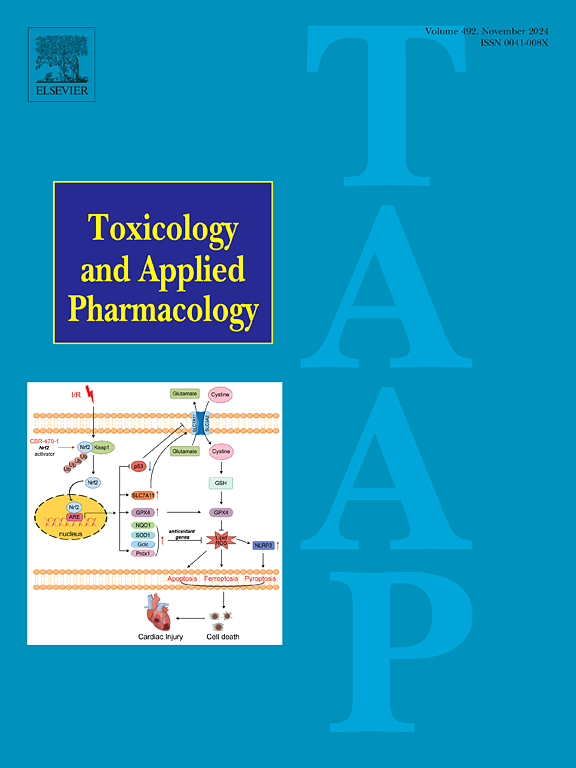花青素-3- o -葡萄糖苷通过调节Kruppel-like factor 4介导的ERK/p38信号通路抑制结直肠癌的恶性进展
IF 3.3
3区 医学
Q2 PHARMACOLOGY & PHARMACY
引用次数: 0
摘要
cyanidin -3- o -glucoside (Cy3g)是一种天然花青素,在结直肠癌(CRC)中具有良好的抗癌作用。然而,其在CRC中的具体机制在很大程度上仍未被探索。目的探讨Cy3g在结直肠癌中的作用机制。方法用CCK-8检测Cy3g作用的人结直肠癌细胞系SW620、HT29、LS174T、HCT116和正常结肠成纤维细胞系CCD-18Co的细胞活力。通过CCK-8、EdU、菌落形成、伤口愈合、Transwell和流式细胞术检测Cy3g对SW620细胞恶性特征的影响。为了进一步阐明Cy3g在结直肠癌中的作用机制,采用RT-qPCR检测KLF4的表达,western blotting检测细胞外信号相关激酶(ERK)和p38的表达。在异种移植小鼠模型中进一步验证了Cy3g对CRC进展的作用和机制。结果scy3g显著抑制人结直肠癌细胞系的细胞活力,但对正常结肠成纤维细胞的细胞活力影响不大。Cy3g剂量依赖性地抑制SW620细胞的增殖、迁移和侵袭,促进细胞凋亡。此外,Cy3g以浓度依赖的方式上调KLF4表达并使ERK/p38通路失活。KLF4敲低逆转了Cy3g对SW620恶性特征及ERK和p38表达的抑制作用。动物实验进一步验证了Cy3g在不改变体重的情况下抑制CRC模型小鼠的肿瘤生长,激活KLF4,抑制ERK/p38通路。结论cy3g通过抑制klf4介导的ERK/p38通路抑制结直肠癌的进展,为结直肠癌的防治提供了新的思路。本文章由计算机程序翻译,如有差异,请以英文原文为准。
Cyanidin-3-O-glucoside inhibits the malignant progression of colorectal cancer by regulating Kruppel-like factor 4-mediated ERK/p38 signaling pathway
Background
Cyanidin-3-O-glucoside (Cy3g) is a natural anthocyanin, showing favorable anti-cancer efficacy in colorectal cancer (CRC). However, its specific mechanism in CRC remains largely unexplored.
Objective
This study aimed to investigate the underlying mechanisms of Cy3g on CRC.
Methods
Cell viability of human CRC cell lines (SW620, HT29, LS174T, and HCT116) and normal colon fibroblast cell line (CCD-18Co) treated with Cy3g was detected by CCK-8. Effects of Cy3g on malignant characteristics of SW620 cells were determined by CCK-8, EdU, colony formation, wound healing, Transwell, and flow cytometry assays. To further elucidate Cy3g's mechanism in CRC, KLF4 expression was detected by RT-qPCR, and expression of the extracellular signal-related kinase (ERK) and p38 was examined by western blotting. The effects and mechanisms of Cy3g on CRC progression were further validated in a xenograft mouse model.
Results
Cy3g significantly inhibited the cell viability of human CRC cell lines but rarely affected the cell viability of normal colon fibroblast. Cy3g dose-dependently inhibited proliferation, migration, and invasion and promoted apoptosis of SW620 cells. Moreover, Cy3g upregulated KLF4 expression and inactivated the ERK/p38 pathway in a concentration-dependent manner. KLF4 knockdown reversed the inhibitory effects of Cy3g on the malignant characteristics of SW620 and expression of ERK and p38. Animal experiments further validated that Cy3g inhibited tumor growth without altering body weight, activated KLF4, and suppressed the ERK/p38 pathway in CRC model mice.
Conclusion
Cy3g inhibits CRC progression by suppressing the KLF4-mediated ERK/p38 pathway, offering new insights into CRC prevention and treatment.
求助全文
通过发布文献求助,成功后即可免费获取论文全文。
去求助
来源期刊
CiteScore
6.80
自引率
2.60%
发文量
309
审稿时长
32 days
期刊介绍:
Toxicology and Applied Pharmacology publishes original scientific research of relevance to animals or humans pertaining to the action of chemicals, drugs, or chemically-defined natural products.
Regular articles address mechanistic approaches to physiological, pharmacologic, biochemical, cellular, or molecular understanding of toxicologic/pathologic lesions and to methods used to describe these responses. Safety Science articles address outstanding state-of-the-art preclinical and human translational characterization of drug and chemical safety employing cutting-edge science. Highly significant Regulatory Safety Science articles will also be considered in this category. Papers concerned with alternatives to the use of experimental animals are encouraged.
Short articles report on high impact studies of broad interest to readers of TAAP that would benefit from rapid publication. These articles should contain no more than a combined total of four figures and tables. Authors should include in their cover letter the justification for consideration of their manuscript as a short article.

 求助内容:
求助内容: 应助结果提醒方式:
应助结果提醒方式:


